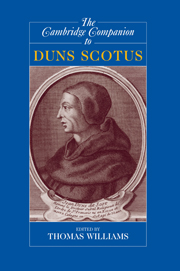Book contents
- Frontmatter
- Introduction
- 1 Scotus on Metaphysics
- 2 Space and Time
- 3 Universals and Individuation
- 4 Duns Scotus’s Modal Theory
- 5 Duns Scotus’s Philosophy of Language
- 6 Duns Scotus on Natural Theology
- 7 Duns Scotus on Natural and Supernatural Knowledge of God
- 8 Philosophy of Mind
- 9 Cognition
- 10 Scotus’s Theory of Natural Law
- 11 From Metaethics to Action Theory
- 12 Rethinking Moral Dispositions
- Bibliography
- Citations of works attributed to John Duns Scotus
- Index
6 - Duns Scotus on Natural Theology
Published online by Cambridge University Press: 28 May 2006
- Frontmatter
- Introduction
- 1 Scotus on Metaphysics
- 2 Space and Time
- 3 Universals and Individuation
- 4 Duns Scotus’s Modal Theory
- 5 Duns Scotus’s Philosophy of Language
- 6 Duns Scotus on Natural Theology
- 7 Duns Scotus on Natural and Supernatural Knowledge of God
- 8 Philosophy of Mind
- 9 Cognition
- 10 Scotus’s Theory of Natural Law
- 11 From Metaethics to Action Theory
- 12 Rethinking Moral Dispositions
- Bibliography
- Citations of works attributed to John Duns Scotus
- Index
Summary
Scotus’s natural theology has the following distinctive claims:
That we can reason demonstratively to the necessary existence and nature of God from what is actually so but not from imagined situations or from conceivability-to-us; rather, only from the possibility logically required for what we know actually to be so.
That there is a univocal transcendental notion of being.
That there are disjunctive transcendental notions that apply exclusively to everything, like 'contingent/necessary', and such that the inferior cannot have a case unless the superior does.
That an a priori demonstration of the existence of God is impossible because there is nothing explanatorily prior to the divine being; thus, reasoning must be a posteriori from the real dependences among things we perceive to the possibility of an absolutely First Being (The First Principle).
That such a being cannot be possible without existing necessarily.
That the First Being (God) is simple, omni-intelligent, free (spontaneous), omnipotent, and positively infinite.
That there is a formal distinction, which is more than a distinction within our concepts or definitions, among the divine attributes.
- Type
- Chapter
- Information
- The Cambridge Companion to Duns Scotus , pp. 193 - 237Publisher: Cambridge University PressPrint publication year: 2002
- 2
- Cited by



